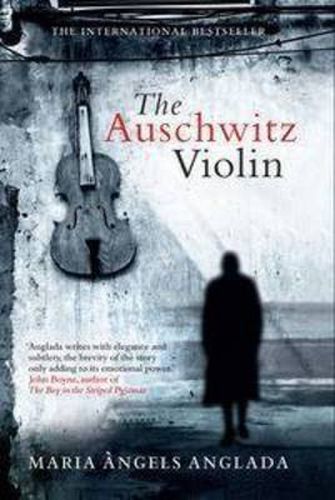The Auschwitz Violin by Maria Àngels Anglada
[[maria]]Auschwitz: the most infamous of all Nazi concentration camps, synonymous with human sufferings so atrocious, they are beyond the comprehension of those who weren’t there. The horrors of that hellhole are sunk deep in our collective unconscious, thanks to the myriad stories that have emerged post holocaust. So it’s a credit to Maria Àngels Anglada that, with The Auschwitz Violin, she is able to style such beauty from the ashes of such misery.
First published in 1994, the book has been beautifully rendered into English by Martha Tennent. It is the story of Daniel, master violin craftsman, who lists his profession as ‘carpenter’ hoping it’ll prove more useful at staving off death. When the music-loving camp commander discovers Daniel is a luthier, he charges him with making a violin. If he fails to complete it in the agreed time, he’ll be given to Doctor Rascher (based on Joseph Mengele) for his heinous medical experiments. For Daniel, the instrument’s smooth curves, its luxurious colour and clear unparalleled tone is juxtaposed with the fear of arbitrary whippings, mysterious disappearances, the constant ache of an empty stomach and an overarching terror that he will fall prey to the sadistic doctor.
Like John Boyne’s The Boy in the Striped Pyjamas, Anglada (despite writing well before the publication of Boyne’s fable) works on the basis that the reader already knows the horrors of the camp and so descriptive passages about punishments and exterminations are few. Rather, Anglada coaxes us to furnish Auschwitz with the imagery of our minds by having us enter Daniel’s blinkered world. Oscillating between hope and despair, he knows only the language of conjecture. He relies on reports that his love, Eva, is working in a factory and fellow Jews taken to ‘labour camps’ are, in fact, systematically shot. A Nazi whim could mean a whipping, an extra apple at mealtime or no food at all. Anglada hefts us into the deathly uncertainty of Auschwitz and leaves us, like all inmates, to flounder. Everything is fear, fear, fear and a desperate desire to stay under the radar to survive. But always, there is the promise of the violin.
With her clear, simple prose, Maria Àngels Anglada strikes the perfect note between faith and anguish in her portrayal of unwavering humanity in the cesspit of evil.
Amy Roil blogs at



